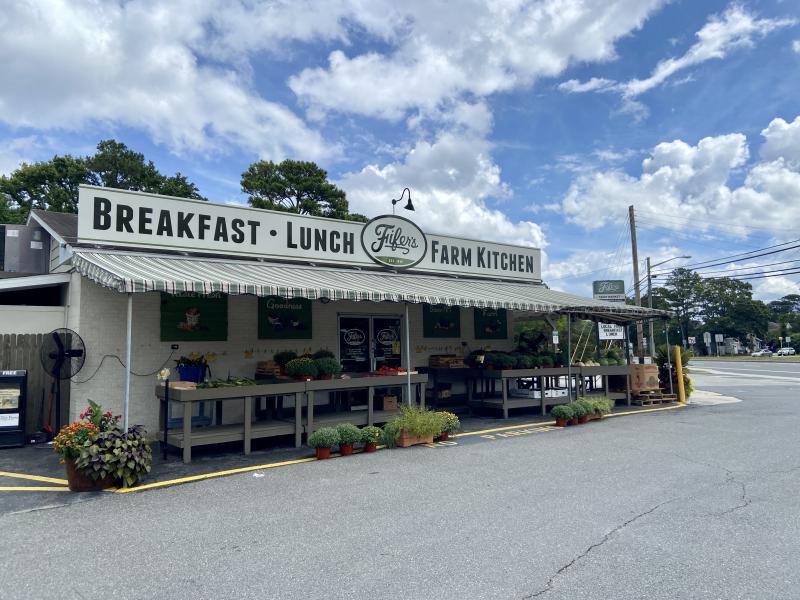Dewey leaders deny Fifer’s request for zoning review
Dewey Beach commissioners denied a property owner’s request to seek input from the planning and zoning commission on a possible code change that some leaders said would lead to increased housing density.
At the Aug. 18 council meeting, attorney Alex Burns, representing Summer Pearl LLC, owner of Fifer’s Farm Kitchen, said his client is seeking a zoning amendment regarding the minimum lot area per dwelling unit.
Burns said he understands there is some opposition to the idea, noting a letter to the editor in that day’s Cape Gazette. Burns said he was not there to give a presentation, but as a procedural step in having the issue sent to planning and zoning for review.
At that point, he said, there will be a public hearing and ample opportunity for public input, and then another public hearing in front of commissioners with a full presentation.
“We hope to, for lack of a better phrase, have our day in court at some point,” Burns said.
Commissioner Gary Persinger said more details were needed, so Burns elaborated. Previously, he said, Fifer’s sought a variance from the Dewey Beach Board of Adjustment, an action that did not involve his law firm.
In September 2022, the BOA voted unanimously to deny the variance request to allow for three residential apartments – two two-bedroom units and one four-bedroom unit – above the market.
The board determined the request did not present an exceptional practical difficulty, as Fifer’s could still construct two four-bedroom units within code.
Town code requires there be 3,600 square feet of lot area for each dwelling unit; therefore, the property would need to be 10,800 square feet to yield three units. The actual size of the Fifer property is 10,048 square feet, yielding 2.8 units, just shy of the three units the owner wants to build.
Burns said his client wants to have the code amended in the Resort Residential and Resort Business districts to decrease the lot area per dwelling to 3,000 square feet, as long as the units don’t exceed 1,500 square feet.
His client has rental units in Lewes, Burns said, and it’s his experience that occupants of smaller units are quieter and better behaved, so he would like to build smaller units.
After Mayor Bill Stevens noted with a chuckle that his own experience in college did not show that occupants of smaller units are better behaved, Persinger said three possibilities may lead to a zoning change.
Continuing, Persinger said: Is there a problem that needs to be solved? Is there an objective in the comprehensive plan that leaders want to pursue? Will the change benefit the town as a whole?
The request doesn’t meet those criteria, Persinger said, and the property can be developed under current code. The issue for the property owner is that he can’t build the number of units he wants, Persinger said, noting the owner originally wanted four apartments, then reduced it to three because he couldn’t manage the parking requirements for four units.
“This is really a customized solution that applies to one property owner,” Persinger said.
The requested change will increase housing density, Persinger said, and commissioners don’t know all the effects it will have on the town. Lots can be combined administratively, without public input or commissioner decision, he said, so the change could apply to even more properties.
Plus, he said, people in a 1,500-square-foot dwelling are not necessarily going to be any better behaved than those in a larger unit.
Town Counsel Fred Townsend noted that code requires commissioners to receive a recommendation from the planning and zoning commission, which should not be interpreted to mean that any item on the agenda has to be sent to the commission.
If town commissioners are not in favor of furthering any study of the proposal, they can elect not to send it to planning and zoning, Townsend said. Before commissioners can vote in favor of a change, he said, they have to receive that recommendation or conclude unanimously that it’s an insignificant change to code.
Stevens said he agreed that commissioners should consider the three criteria outlined by Persinger when considering an amendment. Was the allotted 3,600-square-foot requirement arbitrary, he questioned, noting he also didn’t want code to get in the way of logic. With Fifer’s only a few hundred square feet short, he said, why not send it to the planning and zoning commission and go through the process?
By going through the planning and zoning process, Commissioner Paul Bauer said, leaders will hear more information and public input. Bauer said he didn’t see the harm in sending the request to planners for review, as he needs more detail before making a decision.
“The zoning code is the zoning code,” said Commissioner David Jasinski, noting any property owner can go before the board of adjustment. In this situation, he said, one property owner is asking for a change in the zoning code for two districts to suit their own needs.
“Some people might call that spot zoning,” Jasinski said. “Some people might say you’re just changing it for one person’s needs.”
The issue is about equal treatment, Jasinski said, noting commissioners may be heading down a slippery slope. Jasinski said the 3,600-square-foot requirement was put into place because of the two-lot example; if two lots were combined, it could create a triple townhouse situation.
Jasinski said he is not seeing a lot of people in that area saying they need this, just one single property owner not being able to get what he wants, which sets the town up for a pretty big burden. Jasinski said he would not have a problem with planning and zoning discussing it as part of a larger issue.
During public comment, former Commissioner David Moskowitz spoke via Zoom to say that the biggest complaint in town is about parking, which he said commissioners never studied. The change would allow more development without an understanding of parking issues and population changes in town, he said.
Jasinski’s motion to table the issue failed without a second; Bauer’s motion to send the issue to planning and zoning was seconded by Commissioner Elisabeth Gibbings. The motion failed 2-3, with Bauer and Gibbings voting for, and Jasinski, Persinger and Stevens voting against. After the vote, Stevens said he would never say never, but council shouldn’t be making decisions based on one individual property owner.




















































